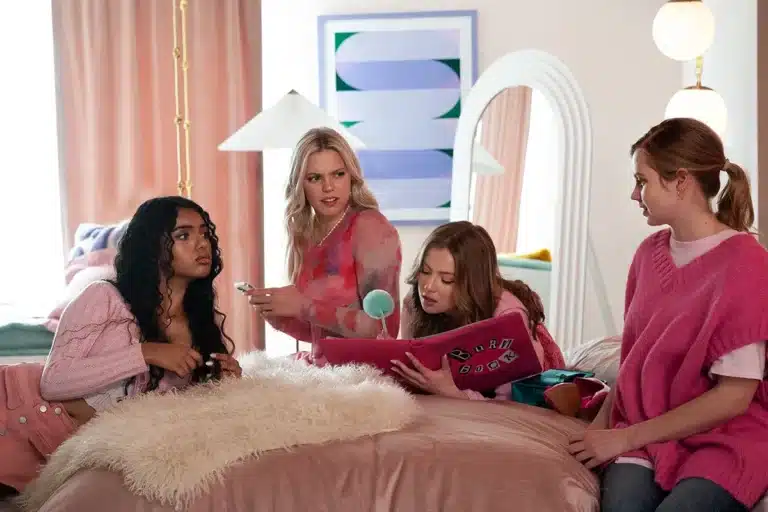
The new “Mean Girls” movie does a lot of things right: It has great representation, an incredibly talented cast who breathe new light into 20-year-old characters and the razzle-dazzle of a musical!
However, the movie adaptation of the Tony-nominated 2018 Broadway musical leaves one character behind: Gretchen Wieners.
In the original 2004 teen rom-com, Lacey Chabert — who isn’t Jewish — played the original Gretchen Wieners. The neurotic sidekick to Rachel McAdams’ Regina George, Gretchen is the only Jewish character we’re introduced to in the “Mean Girls” franchise.
In fact, one of Gretchen’s most iconic scenes in the original movie is when she tells Cady that her parents bought her “really expensive white-gold hoops for Hanukkah” but she wasn’t allowed to wear them because only Regina could wear hoops.
A more subdued version of Ashley Park’s Asian-Jewish Gretchen Weiners in the Broadway musical and less on-the-brink than Chabert’s original, Bebe Wood does a good job in the 2024 adaption with a script that doesn’t add much to the character we all know and love.
In the newest adaptation, Gretchen, played by Bebe Wood, does not get the multi-faceted expansion of many of the other characters. In some ways, she is even diminished. The character feels steamrolled by the expansions and changes producers made to characters like Janis and Karen, who feel like fresh takes on the 2004 originals.
When it comes to other groups, “Mean Girls” is a win for diversity in many of the changes it made.
Karen Smith became Karen Shetty to celebrate actress Avantika Vandanapu’s Indian heritage. Damian is now a proud Black man, played by Jaquel Spivey.
To honor Auliʻi Cravalho’s Hawaiian heritage, Janis’ last name was changed from Ian to Imi’ike, which the actress thought was “really special.” The character, plagued by rumors of being a lesbian in the original, is openly queer in this adaption, changing her dynamic with Regina.
“Previously, in our ’04 version, lesbian for Janis was used kind of as a slur, and we’re taking that back,” Cravalho told Screen Rant.
Many of the homophobic jokes have been taken out and replaced with punchier alternatives that are stand-outs in a film that’s already so quoted. And the movie now includes more diversity in sexuality, body type and race than the original film.
However, the only character who appears to lose her identity, especially one integral to the original character, is Gretchen.
With Gretchen, the “Mean Girls” film fails in both its Latinx and Jewish representation. The large Hispanic Jewish population is often not given proper representation outside of Spanish Inquisition narratives, and Gretchen was a possibility to champion Hispanic Jews.
“Mean Girls” had the opportunity to give viewers a Hispanic Jewish Gretchen Wieners that would have added nuance and depth to a character often criticized for being one-dimensional.
The simple mention that her abuelita gave her a music box she then gifted to Regina is the only Hispanic representation in the movie.
The only inkling of Jewishness is when Gretchen gives Cady a phone with American cultural moments she missed while living in Kenya with a playlist labeled “Ariana Grande Hanukkah.”
The addition of “abuelita” doesn’t add anything to the character, but instead feels forced and tokenized since it is not explored or even referenced again.
One’s heritage doesn’t need to be the central part of a character, but the one-word insert feels too cheap to call Hispanic representation, especially in light of the lack of Jewishness in the character.
This is not to say that the original character’s representation was authentic. In fact, Gretchen’s characterization has been called out for being a Jewish American Princess stereotype and for reinforcing antisemitic stereotypes.
In the original film, Gretchen is the only Plastic with darker features. McAdams and Amanda Seyfried have pin-straight blonde hair and blue eyes. In all three versions, the entirety of North Shore High School wants to sleep with them or be Karen and Regina — no one wants to be Gretchen.
Gretchen has olive skin, dark eyes and dark curls. Compared to her friends, she’s considered the least desirable.
The long-running gag is that no one wants to date her because she is unattractive and difficult. Her large, dark curls — a common Jewish stereotype — are made fun of in the original film when Damien says her hair is so big because “it’s full of secrets.”
In addition to her crippling need for affirmation, Gretchen’s other defining trait is that she is spoiled.
Coddled by her wealthy father, who is the inventor of toaster strudel, Gretchen threatens the school with her father and her lawyer to not take accountability for her actions in relation to the Burn Book.
Unlike Regina, who is both feared and admired, Gretchen is just plainly disliked.
In an original movie scene that was also removed from the newest film, Gretchen falls to the floor when no one catches her during a school-wide trust exercise, saying she’s “sorry that people are jealous of [her] and [she] can’t help it that [she’s] popular.”
While the lack of Jewishness in the new Gretchen takes away the previous problem of reinforcing antisemitic stereotypes and negative representation, stripping a character — especially one so iconic — of her ethnicity and the majority of her characterization is the least fetch part of the new “Mean Girls” movie.
The previous two iterations of Gretchen Wieners weren’t perfect, but they were bitchy and stylish and they were Jewish mean girls.
2024’s Gretchen is still a mean girl for sure, but she — and her Jewishness — feel left behind by a film that largely triumphs in every other way.
Originally Published Jan 16, 2024 02:25PM EST
